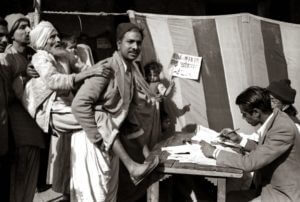The third and the last article of the Independence Day Special will cover the First General Elections and after. We will throw some light on the First General Elections, its result and how the First General Elections is important in the political history of India.
THE FIRST GENERAL ELECTIONS (1952 – 52)
The stage was set for India to hold its first general elections. According to Ramachandra Guha’s India After Gandhi, the election craze was such that in Calcutta (now Kolkata) stray cows had ‘Vote Congress’ written on their backs in Bengali. The election campaigning and canvassing were conducted on a large scale.
Though the Congress was the favorite and the most popular party during that time, favorable conditions were created for the opposition to participate in the elections. The figures of candidates who participated in the election went up to 1874 and 53 political parties. Some of the political parties that participated were, Bharatiya Jana Sangh, CPI, Hindu Mahasabha, Forward Bloc (Marxist), Socialist Party, etc. Regional parties also managed to participate and make their presence noticeable. The main regional state parties that participated were, All Manipur National Union, Jharkhand Party, Cochin Party, Chota Nagpur Santhal Parganas Janta Party, People’s Democratic Front, etc.
The polling for the first general election ended on 27th March 1952. Out of the 17.3 crores population who were eligible to vote, only 45.7% of them exercised their voting rights. The elected contested was for 489 seats. Not only men but women also came to vote in large numbers.
RESULTS
India was waiting to welcome its first ever democratically elected government with bated breath. It was decided before the polling, that the ballot box with the majority of ballot paper at the end of the counting would be declared the winner.
At the end of the counting, the party carrying the national legacy emerged as the winner of the First General Elections of 1951 – 52. The Indian National Congress won 364 out of 489 seats. The Communist Party of India which finished second could only garner 16 seats. Socialist Party finished third with 12 votes.
Indian National Congress won approximately 45% of the total share of votes. Second to it was Communist Party of India with 3.62 votes and Socialist Party with 0.59%.
Pandit Jawahar Lal Nehru was chosen to be the first Prime Minister of Independent India. He headed the government for almost a decade.
Why is the First General Elections important event in the politics of Indian history?
By successfully conducting the general elections, India proved to be the world’s largest democracy. It was the first time that elections were held in India without any discrimination on the basis of caste, creed or gender. Each voter who was above the age of 21 got the right to vote, may it be a women or men, SC or general, Hindu or Muslim. Each voter had one vote and every vote was treated equally.
Many people had doubted if an illiterate country like India could ever hold free and fair elections and make a politically sound decision. But by holding the election successfully, India did not only prove those people wrong but also created the milestone in the history of democracy.
India proved that illiteracy, poverty and rural population cannot stop you from becoming a democracy and holding an election. India was successful in becoming a sovereign, socialist, secular, democratic republic.
Part 1 – The Independence of India and the Integration of Princely States

